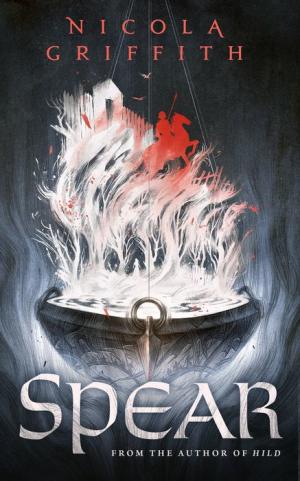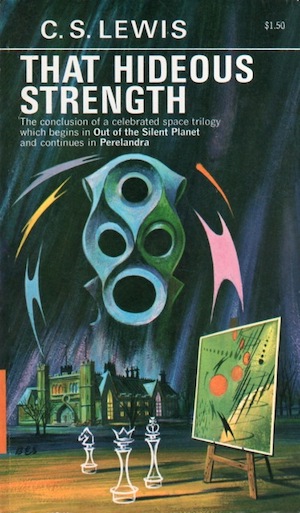Toward the end of That Hideous Strength, after the villains have all perished and we’ve learned that the gods have done their work, our sensible skeptic MacPhee turns to the supposed heroes of the story and says,
…it could be right good history without mentioning you and me or most of those present. I’d be greatly obliged if anyone would tell me what we have done–always apart from feeding the pigs and raising some very decent vegetables.
They’ve been told that they’re in the middle of some great cosmic battle, the fate of humanity and even biological life in their hands, and that, for a time at least, they’ve won. And MacPhee can’t even tell what they’ve done, other than the everyday chores around them. They danced a bit, sure. They helped a young married couple rediscover each other. But what had they actually done?
That Hideous Strength has many, many allusions and parallels and references to the Bible. It centers on discussions about marriage, and about how the world should be but isn’t, and what it means to be obedient, and how the end of the world will come someday but maybe not today. It talks about the once and future king, and the promised return of God (as foreshadowed, of course, by “the gods”). But at the end of the day, it’s a book that tries to show us two simultaneous realities: the mundane world and the celestial one, and the places where they intersect.
One of the things I hated about this book as a kid was that I had been told this was a “Space Trilogy” and all of a sudden here’s this long, long book in which no one goes to space. And I understood on some level that Lewis’s point was very much “Earth is also in space, my friends” and that there were important things happening here, cosmologically, no matter how much I wanted to follow Ransom to discover what was happening on, say, Jupiter.
Lewis’ point is that the humdrum day-to-day things like whether a college should buy a certain plot of land, or whether a man should take a strange new job, or whether a woman should pay attention to the disturbing nightmare from last night, might very well be the most important questions in the galaxy.
That Hideous Strength is, at its heart, apocalyptic. Not in the sense we mean today when we say “post-apocalyptic story.” I don’t mean that this is a story about the end of the world (though it is), or zombies (it kind of is!), or the collapse of human society (hey actually it is!). I mean it in the religious sense of the term: an apocalypse is an “unveiling.” It’s a revealing of something that was not previously known. It’s a story that’s meant to pull the sheet off the world and reveal what’s been underneath all along.
Apocalyptic literature is something that was developed in post-Exilic Judaism (the book of Daniel is a great, fully formed example), and continued into the early Christian traditions (John’s book of Revelation being the most famous). They are books that are prophetic in multiple senses: making strong statements about the political situations of the day, and also speaking to the cyclical nature of the battle between good and evil in human society (i.e., they tell us something about the future as well).
Lewis self-consciously delves into this, mining scriptural themes from an apocalyptic framework. He puts the people of N.I.C.E. into the role of building the Tower of Babel. That story comes from the book of Genesis, a book where we see humanity trying over and over to figure out a way to be in relationship with God and failing, and the world coming to an end and starting again.
The name of this novel, in fact, comes from a poem by David Lyndsay (you can read a chunk here), where the poet talks about the tower of Babel and the “shadow of that hideous strength/Sax mile and mair it is of length.” Theologians at different times have fought over what exactly was so sinful about building a giant tower trying to get to heaven but Lyndsay makes it plain enough: “ambition/And the prideful presumption/How thir proud people did pretend,/Up through the heavens till ascend.” And if you want to know what exactly Lewis thought was going on in his society right at the moment he wrote this book, and why he thought pride and ambition was destroying the world (even in his own little academic pond, setting aside the horrors of the war) you can just read The Abolition of Man, where he lays it out plainly.
In the story of the Tower of Babel, God comes down and stops humanity’s evil plans by confusing their languages. And there is some confusion of language in the latter half of Lewis’ book that directly leads to some destruction for the bad guys (most notably when they mis-identify Merlin), and a great deal more confusion that comes as the zoo gets loose and wreaks havoc on the assembled evil-doers.
Buy the Book


Spear
But it goes beyond that, too, as Merlin and then Nature and then the gods themselves (who are the Oyéresu of the other planets in the solar system) come and completely destroy the town…much like the cities of Sodom and Gomorrah were destroyed in the Bible. (It’s interesting to note, by the way, that the scriptural reason given for the destruction of Sodom and Gomorrah was that they were “arrogant, overfed, and unconcerned; they did not help the poor and needy.” There’s some definite overlap with what Lewis is depicting among the people of N.I.C.E.) And in the end, when divine retribution comes, no one on the side of evil escapes.
But MacPhee’s question is a solid one: what have they actually accomplished? He and the heroes of the novel have mostly been sitting around at a manor house. How had they contributed to this great and glorious victory? Ransom has the answer: “You have done what was required of you.” He goes on to say, “You have obeyed and waited. It will often happen like that. As one of the modern authors has told us, the altar must often be built in one place in order that the fire from heaven may descend somewhere else.” (This is a reference to Charles Williams’ short book He Came Down From Heaven.)
The point being that part of contributing to the cosmic war raging around us is not necessarily to take up weapons and fight so much as is it is to create the world that should be. We need to make holy spaces, feed the animals, take care of the gardens (echoing Adam and Eve here, right?). A healthy marriage does more to save the world than marching into town to fight the bad guys. A group of neighbors who love each other and are at peace with Nature creates space for righteousness to take root in the world and win over the forces of evil.
We could be forgiven for thinking that the point of the story is that England is in the very center of the universe, what with all the talk of Logres versus Britain. But that’s not it at all. Lewis is not saying that England is the center of the cosmic war, but that you and I are. Whatever country you’re living in, whatever neighborhood, whatever relationships you’re entangled in, those are the most important things happening in the entire universe. They are life and death places where your decision to do what is right and good or to embrace evil could have consequences for the whole, and could be the difference between universal victory or communal defeat.
And not because we fought the new curriculum at the university. Not because we voted for this or that candidate. Not because we won an argument on social media or managed to get the job that would make us “truly influential” in the world. No, the most important thing we can do is to be present in the world. To be kind. And when God speaks clearly, to do as instructed. (And what does God say most clearly, over and over, is the most important thing to do? Love God. Love others. Everything else flows from that.)
There is so much more we could talk about in That Hideous Strength. There are an enormous number of allusions, Biblical and otherwise. We could spend an article or two talking about gender and marriage, though I think it will be more interesting if we save it to contrast with Till We Have Faces. We could do at least one article about the Arthurian themes and characters and the battle between Logres and Britain.
But I can’t help but think that in the world we’re inhabiting at this moment the most important thing to take away from That Hideous Strength is this: let us do what is required of us.
You and I may have different requirements put on us, as well. Ransom’s role and Jane’s are quite different, but both essential. Mark’s role and MacPhee’s are vastly different but equally important. And even a bear may have a role to play, on the same day that the planetary spirits which rule the worlds come to enact their long-delayed justice.
So let’s embrace the part given us, whether that’s tending the garden or repairing a marriage or writing a novel or merely being the one to keep someone from boarding the train that is barreling toward destruction.
We’ll meet back here in a few weeks to do a quick look at one more book about devilry: The Screwtape Letters! In the meantime, dear friends, please remember that the people who perform blood sacrifices to possessed severed heads are nearly always the bad guys. Don’t work with those people, even if the money is good.
 Matt Mikalatos is the author of the YA fantasy The Crescent Stone. You can follow him on Twitter or connect on Facebook.
Matt Mikalatos is the author of the YA fantasy The Crescent Stone. You can follow him on Twitter or connect on Facebook.










